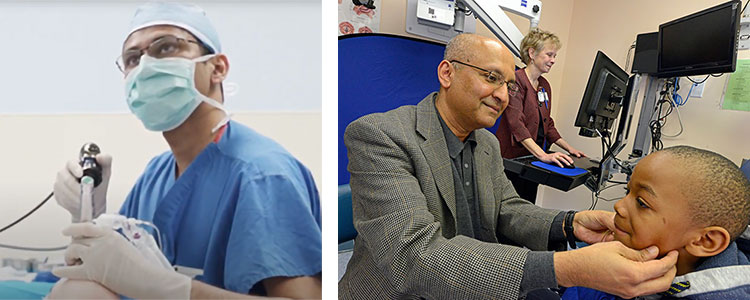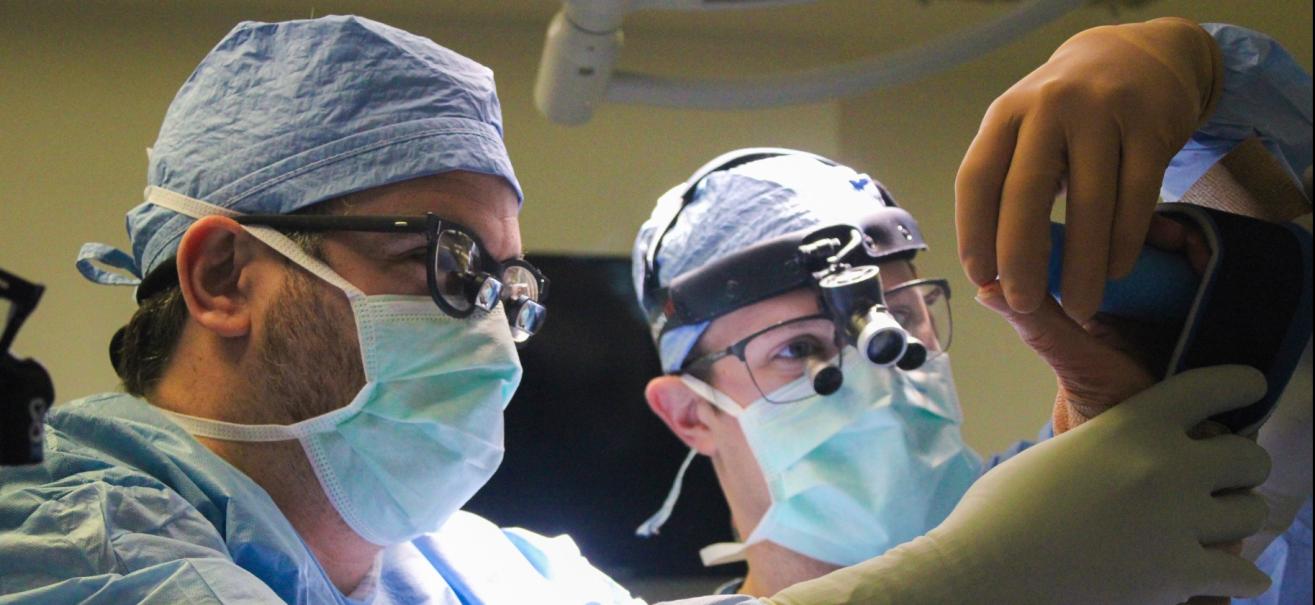In-Depth Look at Otolaryngology and Its Role in Treating Throat Disorders
Wiki Article
Exploring the Area of Otolaryngology: What to Anticipate When You Consult an ENT
Otolaryngology, typically referred to as ENT, encompasses the medical diagnosis and therapy of ear, nose, and throat problems. For those experiencing associated problems, speaking with an ENT specialist can give clearness and relief. Recognizing what to expect throughout such appointments is necessary for effective interaction and care. This overview will describe key facets of the ENT experience, including usual reasons for gos to and the procedures included in medical diagnosis and treatment.
Comprehending Otolaryngology: A Summary
Otolaryngology, typically described as ENT (Throat, ear, and nose) medication, is a customized branch of medication that concentrates on the medical diagnosis and therapy of problems impacting these important areas of the human body. This field encompasses a vast array of problems, consisting of those pertaining to hearing, equilibrium, breathing function, and speech. Otolaryngologists are educated to handle both medical and clinical treatments, utilizing advanced strategies and modern technologies. Their knowledge extends past traditional disorders, addressing issues such as allergies, sinus infections, and hearing loss. Additionally, they play an essential role in the management of head and neck cancers, offering extensive care tailored to private person needs. In general, otolaryngology continues to be essential for keeping health and lifestyle in damaged individuals.Typical Factors to See an ENT Specialist
Numerous people look for the competence of an ENT professional for a selection of factors, reflecting the diverse nature of conditions that affect the nose, ear, and throat. Usual concerns consist of chronic sinusitis, which often brings about persistent nasal congestion and facial pain. Allergies and their associated signs, such as itching and sneezing, additionally motivate visits to these professionals (Sinus). Hearing loss, whether unexpected or steady, is another significant factor for consultation. On top of that, individuals may look for examination for throat conditions, including relentless hoarseness or ingesting difficulties. Rest apnea, defined by cut off breathing during rest, is often dealt with by ENT specialists. Each of these problems highlights the significance of specialized care in managing intricate ENT-related wellness problems
Preparing for Your ENT Consultation
When getting ready for an ENT visit, it is vital to collect appropriate information and take into consideration any type of specific worries. Clients need to put together a comprehensive case history, consisting of previous ear, nose, or throat issues, surgical procedures, and present drugs. Documenting signs and symptoms-- such as extent, frequency, and duration-- can give important understandings for the ENT specialist. Additionally, people need to prepare a list of concerns they desire to ask, guaranteeing that all worries are dealt with during the browse through. Bringing along any appropriate clinical documents or examination results can even more help the ENT in recognizing the patient's condition. Ultimately, patients ought to verify their consultation information, consisting of area, time, and day, to minimize any type of final complication. Correct preparation can boost the performance of the assessment and lead to far better end results.What to Expect During the Assessment
As the assessment starts, the individual can anticipate to participate in an extensive conversation with the ENT professional concerning their signs and symptoms and clinical background. The professional will ask about the duration, regularity, and extent of symptoms such as hearing loss, nasal congestion, or sore throat. In addition, the individual's previous medical conditions, drugs, and any appropriate household history will be reviewed, aiding the professional in creating a total understanding of the client's health. The ENT may additionally ask about way of life elements, such as exposure to irritants or allergens. This open discussion develops a foundation for the examination, making sure that the person's concerns are addressed and setting the phase for any required assessments or recommendations for therapy.
Diagnostic Examinations and Procedures in Otolaryngology
A range of analysis tests and treatments are crucial in otolaryngology to accurately assess and diagnose problems affecting the nose, throat, and ear. Typical examinations consist of audiometry, which measures hearing feature, and tympanometry, examining middle ear stress. Nasal endoscopy allows visualization of the nasal passages and sinuses, while laryngoscopy examines the throat and vocal cords. Imaging strategies, such as CT scans and MRIs, provide in-depth sights of head and neck check frameworks. Allergy screening Find Out More may likewise be performed to recognize triggers for sinus or respiratory problems. These analysis devices make it possible for ENT specialists to create a comprehensive understanding of clients' problems, guaranteeing customized and effective monitoring strategies. Proper diagnosis is crucial for successful therapy outcomes in otolaryngology.Treatment Options Provided by ENT Specialists
ENT specialists provide a range of therapy choices tailored to attend to details problems influencing the nose, throat, and ear. These therapies vary from conservative approaches, such as medicine and way of life alterations, to more intrusive treatments. Allergic reactions might be managed with antihistamines or immunotherapy, while persistent sinusitis may need nasal corticosteroids or sinus surgery. For hearing loss, ENT specialists frequently recommend listening devices or medical treatments like cochlear implants. In situations of throat conditions, options can consist of speech treatment or operations to remove obstructions. Furthermore, they might supply guidance for managing sleep apnea, including using CPAP gadgets or medical interventions. In general, the goal is to boost people' lifestyle through customized treatment and reliable treatment methods.When to Look For Follow-Up Care With an ENT
Recognizing when to seek follow-up treatment with an ENT expert is vital for taking care of recurring signs and symptoms or complications connected to ear, nose, and throat conditions. People need to think about setting up a follow-up consultation if symptoms continue regardless of initial treatment, such as persistent ear pain, nasal blockage, or throat discomfort. Changes in hearing, equilibrium issues, or uncommon nasal discharge might also necessitate further evaluation. Furthermore, if a patient experiences side impacts from recommended drugs or has undergone a procedure, follow-up treatment is necessary to keep track of healing and resolve any kind of concerns. Timely examinations can ensure reliable monitoring of conditions, avoid prospective complications, and give peace of mind pertaining to one's health and wellness. Seeking follow-up treatment promotes aggressive wellness management in otolaryngology.Regularly Asked Inquiries

What Credentials Should I Try to find in an ENT Expert?
When looking for an ENT check this site out expert, one should try to find board certification, appropriate experience, and solid client testimonials. Additionally, reliable communication abilities and a thoughtful technique can significantly improve the total treatment experience.Exactly how Do I Pick the Right ENT for My Needs?
Selecting the appropriate ENT expert includes assessing their certifications, experience, and patient evaluations (Voice). It is important to ponder their communication style and technique to therapy, guaranteeing they align with the individual's details health requirements and choicesAre There Any Type Of Dangers Related To ENT Procedures?
The risks connected with ENT treatments might consist of infection, blood loss, anesthesia issues, and potential damage to surrounding structures. People should discuss these threats with their medical professional to understand individual issues and assurance notified decisions.How Can I Manage Anxiety Before My ENT Appointment?
To manage anxiety before a visit, individuals can practice deep breathing exercises, imagine positive outcomes, prepare inquiries in advancement, and look for support from pals or family members, cultivating a sense of confidence and peace.What Should I Do if I Experience Adverse Effects From Treatment?
If adverse effects from therapy occur, the individual ought to immediately report them to their doctor. Adjustments to therapy or extra interventions might be needed to ensure security and performance in handling their problem - ENT Doctor. As the consultation starts, the patient can anticipate to engage in a complete discussion with the ENT professional regarding their signs and medical background. These diagnostic devices make it possible for ENT experts to develop a comprehensive understanding of patients' problems, making sure tailored and effective management plans. ENT specialists offer a range of treatment options tailored to attend to details conditions impacting the throat, nose, and ear. When seeking an ENT expert, one need to look for board qualification, relevant experience, and solid client testimonials. Choosing the appropriate ENT expert involves evaluating their qualifications, experience, and individual reviewsReport this wiki page